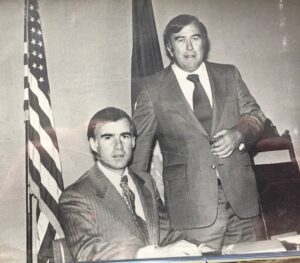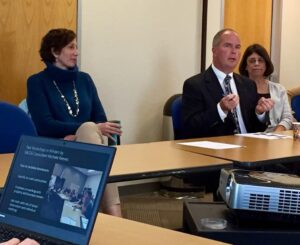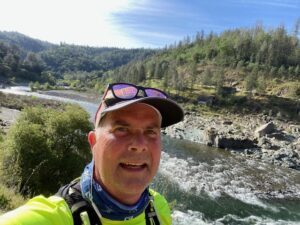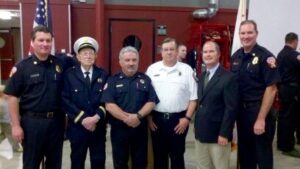What initially prompted you to get involved with local government?
I am a third generation city manager and my calling for public service came to me very early in life. My brothers and I were raised by a single father/city manager who dragged us along to all of the city projects and events he worked on, and we LOVED it. During his tenure, he built community swimming pools, golf courses, parks and revitalized downtown areas. We visited the police and fire stations, regularly engaging with the staff. Our lives were rooted in city government, and it became a natural calling for me.
to me very early in life. My brothers and I were raised by a single father/city manager who dragged us along to all of the city projects and events he worked on, and we LOVED it. During his tenure, he built community swimming pools, golf courses, parks and revitalized downtown areas. We visited the police and fire stations, regularly engaging with the staff. Our lives were rooted in city government, and it became a natural calling for me.
 Why did you want to become a city manager?
Why did you want to become a city manager?
In addition to learning about the profession through my immediate family, during my high school and college years, I loved leading groups to common objectives in sports. I enjoyed building successful teams, coaching others, and collaborating as a group. I knew these interests would translate well into a career in local government where I could apply these skills in a day-to-day professional environment.
Additionally, I was fortunate to have strong role models to help guide my learning about the profession. I was mentored in my early years by some incredible City Managers in Pico Rivera, Dana Point and Grand Terrace. They consistently challenged and motivated me, which empowered me to tackle tasks involving park construction, economic development, redevelopment, taking on the role of lead negotiator, and handling the most demanding and pivotal projects within our industry. They were tough, relentless and demanding in their expectations, and I loved it. I gained an understanding that leadership is rooted in generating success in other people. I discovered that city managers, through mentorship and empowerment, could build strong, resilient communities where its members truly care about making an impact. I was surrounded by other stars and our competitiveness was contagious because we always challenged each other. Occupying the role of city manager empowers you to translate a community vision into reality, collaborating with city council and many others to make dreams become real. In essence, you are the ringleader of a grand circus with an amazing cast who become your “stars” with collective victories in taking on meaningful initiatives!
What was the most important part about your job as a city manager?
In Winters, we established an incredible vision centered around revitalization and enhancing city services, followed by strategic economic development. This comprehensive plan was intended for execution by the staff to make lofty ideas a reality. The road to success was accomplished by setting a course of action, maintaining discipline and overcoming obstacles along the way. In any city, not everything comes easy, and it takes dedication and tenacity to get over the bar sometimes. I consider myself a strategic leader, a team player, and these qualities together allowed me to reach my full potential as a city manager, working with groups of people to accomplish complex goals and objectives. It was magical, and we had a ton of fun doing it.
Which city project are you most proud of during your years as a city manager?
For me, it all started with learning the nuts and bolts of redevelopment on Whittier Blvd in Pico Rivera from some of the best professionals in the business. My lessons learned were taken and applied to the revitalization of Downtown Winters— my proudest professional accomplishment. Like a phoenix rising from the ashes, we were able to redevelop an almost empty downtown into a thriving California attraction and economic engine. Our collaboration with businesses, property owners, regional partners and the State required us to work hard, overcome a ton of frustration and stay disciplined to maintain a high standard of quality. It was fun working for almost 19 years and seeing the incremental improvement morph into a thriving place. I was blessed with an amazing team who stuck around to make it all happen, making it especially rewarding.
Whittier Blvd in Pico Rivera from some of the best professionals in the business. My lessons learned were taken and applied to the revitalization of Downtown Winters— my proudest professional accomplishment. Like a phoenix rising from the ashes, we were able to redevelop an almost empty downtown into a thriving California attraction and economic engine. Our collaboration with businesses, property owners, regional partners and the State required us to work hard, overcome a ton of frustration and stay disciplined to maintain a high standard of quality. It was fun working for almost 19 years and seeing the incremental improvement morph into a thriving place. I was blessed with an amazing team who stuck around to make it all happen, making it especially rewarding.
What are the greatest challenges facing city managers in California today?
City managers are challenged both organizationally and by the edicts from the State. The “silver tsunami” and now the “second wave” of retirements has seen a massive exodus of experience and institutional knowledge from the profession and organizations, which creates a giant learning curve. Additionally, the new generations are more transient in their careers, which causes higher turnover and more required training.
Second, the State of California has adopted massive changes to land use and taken a considerable amount of land use authority and local control away from local government. The blanket rezoning of land use seems to ignore things like utilities and infrastructure, cumulative impacts and the ramifications of their policy. The State bureaucrats are not planners or community based, they are more into enforcement and interpretation. City managers and their staff are in a really tough situation in trying to comply with what is often a moving target. The State is not an impacted stakeholder from the decisions and policy they are setting, yet the culpability for compliance is all local.
What is your favorite way/place to interact with the residents of your city?
 For me, seeing people at community events, sports competitions and even casually at breweries is my favorite way to connect with residents. I have been proud to be a “small town” city manager and the way to interact with folks is NOT AT CITY HALL. Active engagement within the community, enabling individuals to familiarize themselves with you and receive direct updates about ongoing matters, makes all the difference in the world.
For me, seeing people at community events, sports competitions and even casually at breweries is my favorite way to connect with residents. I have been proud to be a “small town” city manager and the way to interact with folks is NOT AT CITY HALL. Active engagement within the community, enabling individuals to familiarize themselves with you and receive direct updates about ongoing matters, makes all the difference in the world.
What is the role of a city manager in upholding the public’s trust in local government?
Trust and character are essential to be a strong municipal leader. I tell people that city managers “think about things that most people never think about.” In Winters, the city attorney was this “country lawyer” who had been the city attorney for 35 years. He was the attorney for everyone in town, and his family had run the local newspaper for over 70 years (the ultimate good old boy). On my first day on the job, he gave me some simple advice: don’t be political, never lie, never do special deals, treat everyone the same and simply be honest and direct on why the city is pursuing initiatives. Saged wisdom!
Every morning in Winters, key local farmers gather at a round table in the downtown cafe to solve the world’s (and the city’s) problems and drink coffee. Periodically, I would go sit with them and answer their questions on what was going on. I got the highest praise from one who told me, “We don’t always like you, but we believe and trust you.”
Your character and the public’s perception are determined by what they think you are doing when nobody is watching. People may not always agree with you, but if they trust your motives, they will accept the few times of disagreement.
How are cities shaping the future of California?
In Pico Rivera, we redeveloped the Whittier Blvd corridor and brought the company building the B-2 Bomber to town, creating thousands of high paying jobs. In Dana Point, we incorporated three coastal areas into a single city and made a jewel—now called the California Riviera. In Winters, we built some of the most amazing affordable housing projects, giving migrants quality places to call home. Cities really are California, and we are where the evolution starts and ends. All the major initiatives, such as adjusting for a new economy, redirecting infrastructure into broadband and remote work opportunities and solving the housing crisis, will all occur on the municipal level. In both Winters and now Auburn, they have initiated a complete re-think of planning and revitalizing downtowns through a “Form Based Code” to redefine the traditional views on core planning and land use. Cities are—and always have been—where it starts and ends.
When you’re not busy working, how do you like to spend your time? What hobbies do you have?
I am an ultra-marathoner and enjoy being outdoors. I run tremendous distances (mostly 50K) and enjoy the training and fellowship of being on the trails. I am an active member of the running community, supporting races both large and small in a variety of capacities. I am a proud Rotarian with projects throughout the world. I love serving the local community through small projects such as helping seniors and serving food to people in need. I have various international endeavors, including projects in Nairobi, Kenya; a wastewater project in Ensenada, Baja California, which aids underprivileged and abandoned youth; a mico-credit beekeeping project in Liberia and many others.
distances (mostly 50K) and enjoy the training and fellowship of being on the trails. I am an active member of the running community, supporting races both large and small in a variety of capacities. I am a proud Rotarian with projects throughout the world. I love serving the local community through small projects such as helping seniors and serving food to people in need. I have various international endeavors, including projects in Nairobi, Kenya; a wastewater project in Ensenada, Baja California, which aids underprivileged and abandoned youth; a mico-credit beekeeping project in Liberia and many others.
What has been one of your greatest professional challenges, and how did you address it?
Without question, it was the COVID-19 pandemic. In March 2020, during a conference call, there was a proposal to shut down the warehouses and distribution networks within our county. The discussion revolved around concerns about potential shortages in supermarkets and the potential for chaos. Cities were thrust into an almost impossible regulatory role, which ran contrary to our mission. The process of shutting down and limiting businesses, implementing public health measures and fundamentally restructuring how we operate our organizations placed an immense weight on us—an experience very few would ever want to go through again. We worked with the business community to enable operation, directed resources and focused on creating possibilities versus obstacles. We achieved a considerable level of success, and I felt a sense of pride for both our team and the community.
COVID-19 has invariably altered the functioning of organizations, leading to changed staff expectations regarding their work tasks, work methods and work location. Organizations are currently faced with the need to completely reevaluate nearly every aspect, as they navigate conflicting expectations, varying generational perspectives and the complexities of forming and assembling teams.
What has your work in public service taught you?
 Don’t be afraid to do big things. Instead of “dreaming,” establish a clear vision, and take action to achieve those significant goals and aspirations. Prayer is a good thing but hedge your prayers with a solid action plan supported by initiatives led by really talented people!
Don’t be afraid to do big things. Instead of “dreaming,” establish a clear vision, and take action to achieve those significant goals and aspirations. Prayer is a good thing but hedge your prayers with a solid action plan supported by initiatives led by really talented people!
Setting and achieving a big community vision is the greatest legacy you can have professionally. In Winters, we saw the renaissance of a small town into a bustling and thriving community, leading to profound changes in numerous lives. Entrepreneurs throughout the town blossomed ideas into a thriving enterprise employing dozens of people.
My biggest priority is NOT letting the loud and boisterous guy at the meeting bully the rest of the folks into silence. Take advantage of technology to allow quality input and engagement from everyone at the meeting to generate great results!
What book is on your nightstand right now?
The “Seven Habits of Highly Effective People”—my personal bible for achieving a quality life, great family and a meaningful career.
